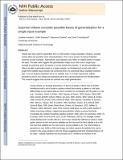Surprise! Infants consider possible bases of generalization for a single input example
Author(s)
Gerken, LouAnn; Dawson, Colin; Chatila, Razanne; Tenenbaum, Joshua B
Downloadnihms568795.pdf (206.6Kb)
OPEN_ACCESS_POLICY
Open Access Policy
Creative Commons Attribution-Noncommercial-Share Alike
Terms of use
Metadata
Show full item recordAbstract
Infants have been shown to generalize from a small number of input examples. However, existing studies allow two possible means of generalization. One is via a process of noting similarities shared by several examples. Alternatively, generalization may reflect an implicit desire to explain the input. The latter view suggests that generalization might occur when even a single input example is surprising, given the learner's current model of the domain. To test the possibility that infants are able to generalize based on a single example, we familiarized 9-month-olds with a single three-syllable input example that contained either one surprising feature (syllable repetition, Experiment 1) or two features (repetition and a rare syllable, Experiment 2). In both experiments, infants generalized only to new strings that maintained all of the surprising features from familiarization. This research suggests that surprise can promote very rapid generalization. Infants have been shown to generalize from a small number of input examples. However, existing studies allow two possible means of generalization.
Date issued
2014-12Department
Massachusetts Institute of Technology. Department of Brain and Cognitive SciencesJournal
Developmental Science
Publisher
Wiley Blackwell
Citation
Gerken, LouAnn et al. “Surprise! Infants Consider Possible Bases of Generalization for a Single Input Example.” Developmental Science 18, 1 (April 2014): 80–89 © 2014 John Wiley & Sons Ltd
Version: Author's final manuscript
ISSN
1363-755X
1467-7687